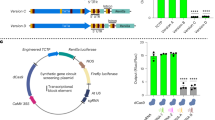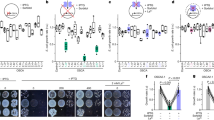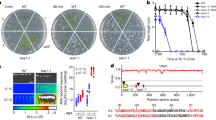Abstract
CELLS of higher plants often retain their usual potentialities when cultivated in vitro. They are able, for example, to regenerate organs or whole plantlets. Yet these properties are not stable and are usually lost some time after isolation of the tissues. The cause of this phenomenon is unknown and it has not yet been possible to influence or control it. In an attempt to clarify the situation we have now been successful in regulating and maintaining the totipotency of carrot cells over prolonged periods.
This is a preview of subscription content, access via your institution
Access options
Subscribe to this journal
Receive 51 print issues and online access
$199.00 per year
only $3.90 per issue
Buy this article
- Purchase on Springer Link
- Instant access to full article PDF
Prices may be subject to local taxes which are calculated during checkout
Similar content being viewed by others
References
Reinert, J., Backs, D., and Krosing, M., Planta, 68, 375 (1966).
White, P. R., The Cultivation of Animal and Plant Cells (Ronald Press, New York, 1954).
Murashige, T., and Skoog, F., Physiol. Plant., 15, 473 (1962).
Reinert, J., Planta, 53, 318 (1959).
Author information
Authors and Affiliations
Rights and permissions
About this article
Cite this article
REINERT, J., BACKS, D. Control of Totipotency in Plant Cells growing in vitro. Nature 220, 1340–1341 (1968). https://doi.org/10.1038/2201340a0
Received:
Issue Date:
DOI: https://doi.org/10.1038/2201340a0
This article is cited by
-
Glucosinolate O-methyltransferase mediated callus formation and affected ROS homeostasis in Arabidopsis thaliana
Physiology and Molecular Biology of Plants (2024)
-
The regeneration of Acer rubrum L. “October Glory” through embryonic callus
BMC Plant Biology (2020)
-
LATERAL ORGAN BOUNDARIES DOMAIN transcription factors direct callus formation in Arabidopsis regeneration
Cell Research (2012)
-
Raised level of cyclin dependent kinase A after prolonged suspension culture of Nicotiana plumbaginifolia is associated with more rapid growth and division, diminished cytoskeleton and lost capacity for regeneration: implications for instability of cultured plant cells
Plant Cell, Tissue and Organ Culture (2005)
-
Restoration of regeneration potentiality in prolonged culture of Digitalis purpurea
Plant Cell, Tissue and Organ Culture (1994)
Comments
By submitting a comment you agree to abide by our Terms and Community Guidelines. If you find something abusive or that does not comply with our terms or guidelines please flag it as inappropriate.



